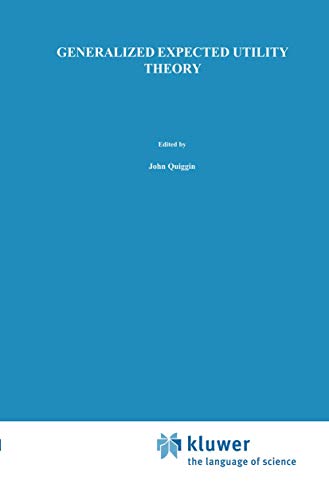generalized expected utility theory de quiggin john (22 resultados)
Filtros de búsqueda
Tipo de artículo
- Todos los tipos de productos
- Libros (22)
- Revistas y publicaciones (No hay ningún otro resultado que coincida con este filtro.)
- Cómics (No hay ningún otro resultado que coincida con este filtro.)
- Partituras (No hay ningún otro resultado que coincida con este filtro.)
- Arte, grabados y pósters (No hay ningún otro resultado que coincida con este filtro.)
- Fotografías (No hay ningún otro resultado que coincida con este filtro.)
- Mapas (No hay ningún otro resultado que coincida con este filtro.)
- Manuscritos y coleccionismo de papel (No hay ningún otro resultado que coincida con este filtro.)
Condición Más información
- Nuevo (18)
- Como nuevo, Excelente o Muy bueno (1)
- Bueno o Aceptable (3)
- Regular o Pobre (No hay ningún otro resultado que coincida con este filtro.)
- Tal como se indica (No hay ningún otro resultado que coincida con este filtro.)
Encuadernación
Más atributos
- Primera edición (1)
- Firmado (No hay ningún otro resultado que coincida con este filtro.)
- Sobrecubierta (No hay ningún otro resultado que coincida con este filtro.)
- Con imágenes (11)
- No impresión bajo demanda (14)
Idioma (1)
Gastos de envío gratis
Ubicación del vendedor
Valoración de los vendedores
-
Generalized Expected Utility Theory. The Rank-dependent Model.
Publicado por Kluwer Academic Publishers,, 1993
ISBN 10: 0792393023 ISBN 13: 9780792393023
Idioma: Inglés
Librería: B.H.HERMES, Berlin, Alemania
EUR 50,00
EUR 20,60 gastos de envío desde Alemania a Estados Unidos de AmericaCantidad disponible: 1 disponibles
Añadir al carrito23 cm, Pappband. Condición: Gut. 208 S. mit Abb. Ehemaliges Bibliotheksexemplar / h10 / 49860 H10 ISBN 0792393023 Sprache: Englisch Gewicht in Gramm: 2550.
-
Generalized Expected Utility Theory: The Rank-Dependent Model
Librería: ThriftBooks-Dallas, Dallas, TX, Estados Unidos de America
EUR 73,36
Gratis gastos de envío en Estados Unidos de AmericaCantidad disponible: 1 disponibles
Añadir al carritoHardcover. Condición: Very Good. No Jacket. May have limited writing in cover pages. Pages are unmarked. ~ ThriftBooks: Read More, Spend Less.
-
Generalized Expected Utility Theory: The Rank-Dependent Model
Publicado por Kluwer Academic, Boston, 1993
Idioma: Inglés
Librería: Pride and Prejudice-Books, Ballston Lake, NY, Estados Unidos de America
Original o primera edición
EUR 71,05
EUR 4,31 gastos de envío en Estados Unidos de AmericaCantidad disponible: 1 disponibles
Añadir al carritoHardcover. Condición: Near Fine. 1st Edition. First Edition. Original black boards. Near Fine. No Dust Jacket. Nice copy.
-
Generalized expected Utility Theory. The Rank-Dependent Model.
Publicado por Kluwer Academic Publishers Boston-Dordrecht-London, 1993
Idioma: Inglés
Librería: Antiquariat Thomas Haker GmbH & Co. KG, Berlin, Alemania
Miembro de asociación: GIAQ
EUR 11,70
EUR 75,00 gastos de envío desde Alemania a Estados Unidos de AmericaCantidad disponible: 1 disponibles
Añadir al carritoCondición: Gut. 208 S. Guter Zustand/ Good With figures. Ex-Library. Sprache: Englisch Gewicht in Gramm: 811 Hardcover/ Pappband fest gebunden.
-
Generalized Expected Utility Theory: The Rank-Dependent Model
Librería: Lucky's Textbooks, Dallas, TX, Estados Unidos de America
EUR 158,20
EUR 3,44 gastos de envío en Estados Unidos de AmericaCantidad disponible: Más de 20 disponibles
Añadir al carritoCondición: New.
-
Generalized Expected Utility Theory: The Rank-Dependent Model
Librería: Lucky's Textbooks, Dallas, TX, Estados Unidos de America
EUR 158,55
EUR 3,44 gastos de envío en Estados Unidos de AmericaCantidad disponible: Más de 20 disponibles
Añadir al carritoCondición: New.
-
Generalized Expected Utility Theory: The Rank-Dependent Model
Librería: Ria Christie Collections, Uxbridge, Reino Unido
EUR 157,74
EUR 13,68 gastos de envío desde Reino Unido a Estados Unidos de AmericaCantidad disponible: Más de 20 disponibles
Añadir al carritoCondición: New. In.
-
Generalized Expected Utility Theory: The Rank-Dependent Model
Librería: Ria Christie Collections, Uxbridge, Reino Unido
EUR 157,74
EUR 13,68 gastos de envío desde Reino Unido a Estados Unidos de AmericaCantidad disponible: Más de 20 disponibles
Añadir al carritoCondición: New. In.
-
EUR 210,98
EUR 3,44 gastos de envío en Estados Unidos de AmericaCantidad disponible: 4 disponibles
Añadir al carritoCondición: New. pp. 224 Indexes.
-
Generalized Expected Utility Theory | The Rank-Dependent Model
Librería: preigu, Osnabrück, Alemania
EUR 141,90
EUR 70,00 gastos de envío desde Alemania a Estados Unidos de AmericaCantidad disponible: 5 disponibles
Añadir al carritoTaschenbuch. Condición: Neu. Generalized Expected Utility Theory | The Rank-Dependent Model | John Quiggin | Taschenbuch | XII | Englisch | 2012 | Springer | EAN 9789401049665 | Verantwortliche Person für die EU: Springer Verlag GmbH, Tiergartenstr. 17, 69121 Heidelberg, juergen[dot]hartmann[at]springer[dot]com | Anbieter: preigu.
-
Generalized Expected Utility Theory
Publicado por Springer Netherlands, Springer Netherlands Dez 1992, 1992
ISBN 10: 0792393023 ISBN 13: 9780792393023
Idioma: Inglés
Librería: buchversandmimpf2000, Emtmannsberg, BAYE, Alemania
EUR 160,49
EUR 60,00 gastos de envío desde Alemania a Estados Unidos de AmericaCantidad disponible: 2 disponibles
Añadir al carritoBuch. Condición: Neu. Neuware -Economic analysis of choice under uncertainty has been dominated by the expected utility (EU) model, yet the EU model has never been without critics. Psychologists accumulated evidence that individual choices under uncertainty were inconsistent with the predictions of the EU model. Applied work in areas such as finance was dominated by the simpler mean-variance analysis. In the 1980s this skepticism was dispelled as a number of generalizations of EU were proposed, most of which were capable of explaining evidence inconsistent with EU, while preserving transitivity and dominance.Generalized expected utility is now a flourishing subfield of economics, with dozens of competing models and considerable literature exploring their theoretical properties and comparing their empirical performance. But the EU model remains the principal tool for the analysis of choice under uncertainty. There is a view that generalized models are too difficult to handle or incapable of generating sharp results. This creates a need to show that the new models can be used in the kinds of economic analysis for which EU has been used, and that they can yield new and interesting results.This book meets this need by describing one of the most popular generalized models -- the rank-dependent expected utility model (RDEU), also known as anticipated utility, EU with rank-dependent preferences, the dual theory of choice under uncertainty, and simply as rank-dependent utility. As the many names indicate, the model has been approached in many ways by many scientists and for this reason, consideration of a single model sheds light on many of the concerns that have motivated the development of generalized utility models.The popularity of the RDEU model rests on its simplicity and tractability. The standard tools of analysis developed for EU theory may be applied to the RDEU model, but since RDEU admits behavior inconsistent with EU, thefield of potential applications is widened. As such, the RDEU model is not as much a competitor to EU as an extension based on less restrictive assumptions.Springer Verlag GmbH, Tiergartenstr. 17, 69121 Heidelberg 224 pp. Englisch.
-
Generalized Expected Utility Theory : The Rank-Dependent Model
Librería: AHA-BUCH GmbH, Einbeck, Alemania
EUR 162,91
EUR 61,74 gastos de envío desde Alemania a Estados Unidos de AmericaCantidad disponible: 1 disponibles
Añadir al carritoTaschenbuch. Condición: Neu. Druck auf Anfrage Neuware - Printed after ordering - Economic analysis of choice under uncertainty has been dominated by the expected utility (EU) model, yet the EU model has never been without critics. Psychologists accumulated evidence that individual choices under uncertainty were inconsistent with the predictions of the EU model. Applied work in areas such as finance was dominated by the simpler mean-variance analysis. In the 1980s this skepticism was dispelled as a number of generalizations of EU were proposed, most of which were capable of explaining evidence inconsistent with EU, while preserving transitivity and dominance. Generalized expected utility is now a flourishing subfield of economics, with dozens of competing models and considerable literature exploring their theoretical properties and comparing their empirical performance. But the EU model remains the principal tool for the analysis of choice under uncertainty. There is a view that generalized models are too difficult to handle or incapable of generating sharp results. This creates a need to show that the new models can be used in the kinds of economic analysis for which EU has been used, and that they can yield new and interesting results. This book meets this need by describing one of the most popular generalized models -- the rank-dependent expected utility model (RDEU), also known as anticipated utility, EU with rank-dependent preferences, the dual theory of choice under uncertainty, and simply as rank-dependent utility. As the many names indicate, the model has been approached in many ways by many scientists and for this reason, consideration of a single model sheds light on many of the concerns that have motivated the development of generalized utility models. The popularity of the RDEU model rests on its simplicity and tractability. The standard tools of analysis developed for EU theory may be applied to the RDEU model, but since RDEU admits behavior inconsistent with EU, thefield of potential applications is widened. As such, the RDEU model is not as much a competitor to EU as an extension based on less restrictive assumptions.
-
Generalized Expected Utility Theory : The Rank-Dependent Model
Publicado por Springer Netherlands, Springer Netherlands, 1992
ISBN 10: 0792393023 ISBN 13: 9780792393023
Idioma: Inglés
Librería: AHA-BUCH GmbH, Einbeck, Alemania
EUR 168,73
EUR 62,53 gastos de envío desde Alemania a Estados Unidos de AmericaCantidad disponible: 1 disponibles
Añadir al carritoBuch. Condición: Neu. Druck auf Anfrage Neuware - Printed after ordering - Economic analysis of choice under uncertainty has been dominated by the expected utility (EU) model, yet the EU model has never been without critics. Psychologists accumulated evidence that individual choices under uncertainty were inconsistent with the predictions of the EU model. Applied work in areas such as finance was dominated by the simpler mean-variance analysis. In the 1980s this skepticism was dispelled as a number of generalizations of EU were proposed, most of which were capable of explaining evidence inconsistent with EU, while preserving transitivity and dominance. Generalized expected utility is now a flourishing subfield of economics, with dozens of competing models and considerable literature exploring their theoretical properties and comparing their empirical performance. But the EU model remains the principal tool for the analysis of choice under uncertainty. There is a view that generalized models are too difficult to handle or incapable of generating sharp results. This creates a need to show that the new models can be used in the kinds of economic analysis for which EU has been used, and that they can yield new and interesting results. This book meets this need by describing one of the most popular generalized models -- the rank-dependent expected utility model (RDEU), also known as anticipated utility, EU with rank-dependent preferences, the dual theory of choice under uncertainty, and simply as rank-dependent utility. As the many names indicate, the model has been approached in many ways by many scientists and for this reason, consideration of a single model sheds light on many of the concerns that have motivated the development of generalized utility models. The popularity of the RDEU model rests on its simplicity and tractability. The standard tools of analysis developed for EU theory may be applied to the RDEU model, but since RDEU admits behavior inconsistent with EU, thefield of potential applications is widened. As such, the RDEU model is not as much a competitor to EU as an extension based on less restrictive assumptions.
-
Generalized Expected Utility Theory: The Rank-Dependent Model
Librería: Revaluation Books, Exeter, Reino Unido
EUR 231,84
EUR 11,42 gastos de envío desde Reino Unido a Estados Unidos de AmericaCantidad disponible: 2 disponibles
Añadir al carritoPaperback. Condición: Brand New. 224 pages. 9.25x6.10x0.51 inches. In Stock.
-
Generalized Expected Utility Theory
Publicado por Springer Netherlands Sep 2012, 2012
ISBN 10: 9401049661 ISBN 13: 9789401049665
Idioma: Inglés
Librería: BuchWeltWeit Ludwig Meier e.K., Bergisch Gladbach, Alemania
EUR 160,49
EUR 23,00 gastos de envío desde Alemania a Estados Unidos de AmericaCantidad disponible: 2 disponibles
Añadir al carritoTaschenbuch. Condición: Neu. This item is printed on demand - it takes 3-4 days longer - Neuware -Economic analysis of choice under uncertainty has been dominated by the expected utility (EU) model, yet the EU model has never been without critics. Psychologists accumulated evidence that individual choices under uncertainty were inconsistent with the predictions of the EU model. Applied work in areas such as finance was dominated by the simpler mean-variance analysis. In the 1980s this skepticism was dispelled as a number of generalizations of EU were proposed, most of which were capable of explaining evidence inconsistent with EU, while preserving transitivity and dominance. Generalized expected utility is now a flourishing subfield of economics, with dozens of competing models and considerable literature exploring their theoretical properties and comparing their empirical performance. But the EU model remains the principal tool for the analysis of choice under uncertainty. There is a view that generalized models are too difficult to handle or incapable of generating sharp results. This creates a need to show that the new models can be used in the kinds of economic analysis for which EU has been used, and that they can yield new and interesting results. This book meets this need by describing one of the most popular generalized models -- the rank-dependent expected utility model (RDEU), also known as anticipated utility, EU with rank-dependent preferences, the dual theory of choice under uncertainty, and simply as rank-dependent utility. As the many names indicate, the model has been approached in many ways by many scientists and for this reason, consideration of a single model sheds light on many of the concerns that have motivated the development of generalized utility models. The popularity of the RDEU model rests on its simplicity and tractability. The standard tools of analysis developed for EU theory may be applied to the RDEU model, but since RDEU admits behavior inconsistent with EU, thefield of potential applications is widened. As such, the RDEU model is not as much a competitor to EU as an extension based on less restrictive assumptions. 224 pp. Englisch.
-
Generalized Expected Utility Theory
Publicado por Springer Netherlands Dez 1992, 1992
ISBN 10: 0792393023 ISBN 13: 9780792393023
Idioma: Inglés
Librería: BuchWeltWeit Ludwig Meier e.K., Bergisch Gladbach, Alemania
EUR 160,49
EUR 23,00 gastos de envío desde Alemania a Estados Unidos de AmericaCantidad disponible: 2 disponibles
Añadir al carritoBuch. Condición: Neu. This item is printed on demand - it takes 3-4 days longer - Neuware -Economic analysis of choice under uncertainty has been dominated by the expected utility (EU) model, yet the EU model has never been without critics. Psychologists accumulated evidence that individual choices under uncertainty were inconsistent with the predictions of the EU model. Applied work in areas such as finance was dominated by the simpler mean-variance analysis. In the 1980s this skepticism was dispelled as a number of generalizations of EU were proposed, most of which were capable of explaining evidence inconsistent with EU, while preserving transitivity and dominance. Generalized expected utility is now a flourishing subfield of economics, with dozens of competing models and considerable literature exploring their theoretical properties and comparing their empirical performance. But the EU model remains the principal tool for the analysis of choice under uncertainty. There is a view that generalized models are too difficult to handle or incapable of generating sharp results. This creates a need to show that the new models can be used in the kinds of economic analysis for which EU has been used, and that they can yield new and interesting results. This book meets this need by describing one of the most popular generalized models -- the rank-dependent expected utility model (RDEU), also known as anticipated utility, EU with rank-dependent preferences, the dual theory of choice under uncertainty, and simply as rank-dependent utility. As the many names indicate, the model has been approached in many ways by many scientists and for this reason, consideration of a single model sheds light on many of the concerns that have motivated the development of generalized utility models. The popularity of the RDEU model rests on its simplicity and tractability. The standard tools of analysis developed for EU theory may be applied to the RDEU model, but since RDEU admits behavior inconsistent with EU, the field of potential applications is widened. As such, the RDEU model is not as much a competitor to EU as an extension based on less restrictive assumptions. 224 pp. Englisch.
-
Generalized Expected Utility Theory
Librería: moluna, Greven, Alemania
EUR 136,16
EUR 48,99 gastos de envío desde Alemania a Estados Unidos de AmericaCantidad disponible: Más de 20 disponibles
Añadir al carritoCondición: New. Dieser Artikel ist ein Print on Demand Artikel und wird nach Ihrer Bestellung fuer Sie gedruckt. Economic analysis of choice under uncertainty has been dominated by the expected utility (EU) model, yet the EU model has never been without critics. Psychologists accumulated evidence that individual choices under uncertainty were inconsistent with the .
-
Generalized Expected Utility Theory
Librería: moluna, Greven, Alemania
EUR 136,16
EUR 48,99 gastos de envío desde Alemania a Estados Unidos de AmericaCantidad disponible: Más de 20 disponibles
Añadir al carritoGebunden. Condición: New. Dieser Artikel ist ein Print on Demand Artikel und wird nach Ihrer Bestellung fuer Sie gedruckt. Economic analysis of choice under uncertainty has been dominated by the expected utility (EU) model, yet the EU model has never been without critics. Psychologists accumulated evidence that individual choices under uncertainty were inconsistent with the .
-
Generalized Expected Utility Theory | The Rank-Dependent Model
Librería: preigu, Osnabrück, Alemania
EUR 141,90
EUR 70,00 gastos de envío desde Alemania a Estados Unidos de AmericaCantidad disponible: 5 disponibles
Añadir al carritoBuch. Condición: Neu. Generalized Expected Utility Theory | The Rank-Dependent Model | John Quiggin | Buch | xii | Englisch | 1992 | Springer Netherland | EAN 9780792393023 | Verantwortliche Person für die EU: Springer Verlag GmbH, Tiergartenstr. 17, 69121 Heidelberg, juergen[dot]hartmann[at]springer[dot]com | Anbieter: preigu Print on Demand.
-
Generalized Expected Utility Theory
Publicado por Springer Netherlands, Springer Netherlands Sep 2012, 2012
ISBN 10: 9401049661 ISBN 13: 9789401049665
Idioma: Inglés
Librería: buchversandmimpf2000, Emtmannsberg, BAYE, Alemania
EUR 160,49
EUR 60,00 gastos de envío desde Alemania a Estados Unidos de AmericaCantidad disponible: 1 disponibles
Añadir al carritoTaschenbuch. Condición: Neu. This item is printed on demand - Print on Demand Titel. Neuware -Economic analysis of choice under uncertainty has been dominated by the expected utility (EU) model, yet the EU model has never been without critics. Psychologists accumulated evidence that individual choices under uncertainty were inconsistent with the predictions of the EU model. Applied work in areas such as finance was dominated by the simpler mean-variance analysis. In the 1980s this skepticism was dispelled as a number of generalizations of EU were proposed, most of which were capable of explaining evidence inconsistent with EU, while preserving transitivity and dominance.Generalized expected utility is now a flourishing subfield of economics, with dozens of competing models and considerable literature exploring their theoretical properties and comparing their empirical performance. But the EU model remains the principal tool for the analysis of choice under uncertainty. There is a view that generalized models are too difficult to handle or incapable of generating sharp results. This creates a need to show that the new models can be used in the kinds of economic analysis for which EU has been used, and that they can yield new and interesting results.This book meets this need by describing one of the most popular generalized models -- the rank-dependent expected utility model (RDEU), also known as anticipated utility, EU with rank-dependent preferences, the dual theory of choice under uncertainty, and simply as rank-dependent utility. As the many names indicate, the model has been approached in many ways by many scientists and for this reason, consideration of a single model sheds light on many of the concerns that have motivated the development of generalized utility models.The popularity of the RDEU model rests on its simplicity and tractability. The standard tools of analysis developed for EU theory may be applied to the RDEU model, but since RDEU admits behavior inconsistent with EU, thefield of potential applications is widened. As such, the RDEU model is not as much a competitor to EU as an extension based on less restrictive assumptions.Springer Verlag GmbH, Tiergartenstr. 17, 69121 Heidelberg 224 pp. Englisch.
-
Generalized Expected Utility Theory
Librería: Majestic Books, Hounslow, Reino Unido
EUR 227,23
EUR 7,42 gastos de envío desde Reino Unido a Estados Unidos de AmericaCantidad disponible: 4 disponibles
Añadir al carritoCondición: New. Print on Demand pp. 224 49:B&W 6.14 x 9.21 in or 234 x 156 mm (Royal 8vo) Perfect Bound on White w/Gloss Lam.
-
Generalized Expected Utility Theory
Librería: Biblios, Frankfurt am main, HESSE, Alemania
EUR 227,83
EUR 9,95 gastos de envío desde Alemania a Estados Unidos de AmericaCantidad disponible: 4 disponibles
Añadir al carritoCondición: New. PRINT ON DEMAND pp. 224.















